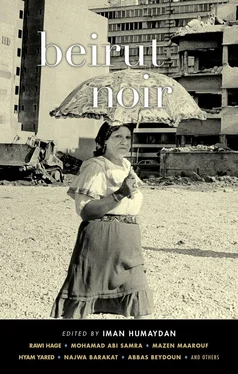My mother doesn’t wake me up because there’s no reason to wake me up. Schools are closed because it’s summer vacation. Or because the war is about to start. Or both. The important thing is that I’m sleeping more and that even while asleep I am practicing tightening my eyelids so that they come down completely vertical.
But I also practice another thing. Each and every day, I practice rolling like a box. On the carpet. I bend my knees and ball myself up so that my arms are at a right angle to my chest. I then try to push myself up. This exercise is also difficult. Especially the stage when you have to turn yourself upside down and balance on just your head and knees. If our house were positioned on a slope like our building is, then this would surely be much easier. I wouldn’t have minded rolling myself down the slope had there not been so many cars there, as well as the residents of our building and the building next to ours who greeted passersby, even strangers, by throwing things at them — potatoes, empty cans of sardines, bottle tops, balloons filled with dirty water, and other things.
I came to an agreement with the boxes I made that we’d change every day. And they accepted it. In reality, that’s because I wasn’t able to make boxes of the same size every day. Indeed, what I made weren’t exactly boxes, but rather forms very much like boxes, so much so that if you saw them you couldn’t call them anything other than boxes, unless you were a math professor or a carpenter. But the boxes didn’t think about all this. All they cared about was being closed on all sides. And empty. I valued that a lot because everything around me was getting bigger, increasing in size. Even the cities being destroyed had something in them that was expanding and filling them up. I don’t know what to call it, but when I look in a history book at two pictures of this city before the war and during the war, a feeling inside me tells me that something in the city had grown and expanded in the second picture.
My intense love for boxes made me want to visit a number of places around the world with them. When I thought about all the countries of the world, I thought about the amusement parks in those countries. And I decided to not take the boxes there. No doubt, like me they would see many children flying toward giant, colorful rides — swinging and flying and crawling and bouncing around — and not one of them would be interested in what a small box could do. In those foreign countries I wouldn’t allow myself to wander around among the children whose languages I couldn’t even speak, to convince them of the power of a small box to carry the whole world around in parts and move it to other places.
For the sake of these boxes alone, not for my own sake, I wanted to copy myself like you copy a piece of paper in a photocopy machine. Then I would put each copy of myself into a small box. Afterward, I would become closed and empty like them. And I would leave the boxes in places far away from each other. Nothing would bring them together. One of the places would perhaps be a cave. Perhaps the second place would be some fancy, decorated trunk at the bottom of the sea. Perhaps the third place would be a hill of debris made of old telephones in a village very far from here.
That was all I wanted to know about the power of small wooden boxes before I got close to Nazmi. I became his good friend when he started to help me collect wood. He used to steal it from the shop at the bottom of the slope, where he worked. But this shouldn’t lead anyone to believe that he was one of those bad boys in the neighborhood. As for me, when I learned the wood was stolen I didn’t get angry with him. I didn’t care about the circumstances that brought the wood to my house. Indeed, I urged him to bring more. I would use all the expressions that meant bring me when I talked to him. But I didn’t ever once utter the word steal.
It’s important to remember the first time we had a conversation about the usefulness of wood. I realized that he was a simple man and that is all anyone knew about him. My realization was not because of my great insight. No boy of eleven is able to use insightful as word to describe himself. I believe in order to be insightful you shouldn’t ever sleep. You should constantly observe everything around you. Like someone spying on everything — no matter whether moving or still — in order to live some additional days. I can’t be insightful. I don’t want to warn anyone about anything. It’s as if I need to sleep and practice closing my eyelids vertically, and I still can’t manage to do it. I can’t speak about the paths of the planets, or about people’s lives either, because I haven’t delved into these things. I don’t mind becoming a part of any life that others might suggest for me in the future; however, I’m busy right now. I don’t have time. My preoccupations are deep and confined to the boxes. Raising them higher. I don’t know how.
In addition to the question of the eyelids, I also have to practice rolling on the rug, as I mentioned before. Then there’s my interest in Nazmi’s story. Now. Telling it with no additions or deletions. Because he was simple and his life didn’t require any explanations, excess letters, or doctors. In the beginning of our friendship he assigned me the nickname “Eraser.” The name embarrassed me. It embarrassed me a lot and I was afraid it would stick to me. But then I added up the weight of his daily misery — carrying heavy gas cylinders on his shoulder, from the foot of the hill all the way up to the top, to the top floor of the tallest building, so he could install it with the help of a heavy screwdriver — “the wrench,” as we used to call it. Sometimes he had to go back down the hill again to the street and search for it because it had slipped out of the back pocket of his loose trousers without him noticing. When I thought about all this, I felt that Eraser was a nice compensation. And that he wouldn’t call me this name were he not convinced of my ability to erase his daily misery in minutes, those very same minutes we spend at night on the roof of the building throwing wooden boxes in the air.
“Up! Up! To the top of the hill! To the top floor!” he shouted, shutting his eyes tight. He closed them as if they were extraneous things on his face.
So I corrected him: “The sky isn’t the beginning of the incline, and it isn’t the top floor at the beginning of the incline. The sky is farther away. A lot farther than that. Farther than the top of a column or the horn of a truck.”
He asked me, “When will we get there?”
He often asked questions like this. Difficult ones that I didn’t know anything about. I felt that these questions were very serious. More serious than me and all my thoughts. They used to spoil my woodworking projects for a moment. But I started to love him like someone who loves a burden. A burden of small boxes. Indeed, I felt that I was responsible for him, so I shared my secret with him about the relationship of boxes to space, and particularly the stars. He hadn’t seen stars before. That’s what he told me. I got frustrated a lot. And I blamed him. But he’d be perplexed and tell me that this wasn’t a fault of his whole body, but a fault of his head alone, in fact a very small part of his head, the part that hadn’t ever thought of looking at the sky at night...
But from the time he first found out about the existence of stars, he started carrying gas canisters to houses along the incline all day long — up Beirut’s Caracas Hill — while staring at the sky. He would stare and wonder if the stars were really there. Are all these stars merely a trick of the night? I am sure he meant an evil trick. I expended all my energy trying to convince him that the stars were actually there, but I couldn’t. I didn’t care. Until one evening when I told him, “We’ll throw wooden boxes up toward space.”
Читать дальше












